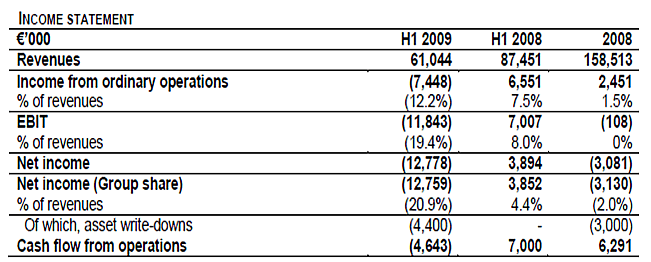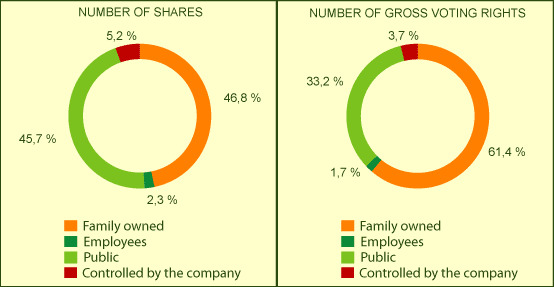 Rougier SA Group
Rougier SA Group
All data are collected in the Fiscal Year of 2008-2009.
Company Profile and History
The Rougier SA group is a timber company which has been operating in Central Africa for 50 years and is one of the region’s principal loggers. It is listed on the Paris Stock Exchange. The group’s French trading and importing subsidiaries are Rougier International, Rougier Panneaux and Rougier Sylvaco. Rougier Panneaux distributes plywood; its products include timber from a wide range of species, especially Okoumé from Gabon and Ayous from Cameroon. Rougier Sylvaco is a trader and importer of timber. Its French processing divisions are Marotte and CEPAM. Marotte is one of France’s leading producers of veneer and decorative timber panels, while CEPAM specialises in flooring, facings and edgings, mainly for the French market.
Born and raised in France's Normandy region, Alexandre Rougier began a career as a mechanical engineer, working in a factory that produced boxes and crates for the region's famed camembert cheeses and butter. Rougier's wife, however, came from Frontenay-Rohan, a village nearby Niort in the Deux-Sèvres region of Poitou-Charentes, and it was on a visit there that Rougier decided to go into business for himself. During a dinner, one of the family suggested that Rougier could transfer his packaging experience to the region around Niort, famed for its butter and for its goat cheeses-where the logging of the region's marshlands and their vast poplar forests was entering a period of intense activity.
Rougier took up the suggestion, moving to the Deux-Sèvres region and creating Etablissements Rougier et Fils in 1923. The company's first location was a small warehouse in the village of Magné. From its beginning the company was involved in two areas: logging and light packaging. In 1928, however, the company expanded into plywood production, opening a new factory in Niort and moving its headquarters to the Deux-Sèvres capitol. In the years leading up to the Second World War, Rougier continued to grow, becoming one of the region's premier businesses.
Following the Second World War, Rougier began expanding its sales and distribution network, creating in 1946 a subsidiary, Bois Particules Contreplaqués, and opening offices and warehouses in Paris and the suburbs around Paris, and in Marseilles, Tourcoing, Lyon, Metz, Nice, Béziers, and Strasbourg. The company's product line by then included veneer panels, especially for the cabinet making trade, pre-cut veneer products, and lath panels.
The company's expansion soon led to a supply problem. Faced with a need to ensure a ready and affordable supply of raw lumber, Rougier entered a new phase in its corporate development. In 1952, the company acquired Compagnie Forestière d'Azingo, a logging concern based in Gabon, which held concessions for some 21,000 hectares of the country's forest lands, as well as properties in Port-Gentil and Labaréné. Rougier also began acquiring logging concession in Gabon in its own right throughout the 1950s. In Gabon, the company expanded its logging concession with the takeover of Forestière de Lambaréné in 1966. In that year, the company also established the first of its Gabon-based industrial operations, creating the subsidiary Société Africaine de Déroulage des Ets Rougier (SADER) and building a veneering plant for logs that were of too small diameter for processing in Rougier's French factories.
It has three forest management schemes in Gabon: 288,626 ha Haut-Abanga Sustainable Management Forest Concession (SMFC), management scheme agreed in January 2002; 282,030 ha Ogooué-Ivindo SMFC scheme and a management scheme by the CIFHO company, Rougier Gabon’s subsidiary (117,606 ha Léké SMFC, management scheme agreed in February 2007).
In Country Location
Oloumi Industrial Estate, Libreville, Gabon;
Telephone: +241 74 31 50
Telefax: +241 74 31 48
Services and Products
Through its subsidiary Rougier International, Rougier sells logs, sawntimber and plywood throughout the world coming from its units in Africa.
Factory in Mbouma Oyali
Opened in 2005, the Mbouma Oyali production unit is located near Franceville (in south eastern Gabon), 700 km from Libreville. The Moyabi-Léké forest concession, extending over more than 300,000 hectares, guarantees the factory a regular and abundant supply of wood. The factory is equipped with 6 box kilns and is located 12 km from the railway station where the containers can leave directly for the port of Owendo.
Factory in Owendo
The plywood factory in Owendo, Libreville port, processes over 60,000 m³ of lumber logs carried by road and railway from Rougier Gabon's four SMFCs covering a total area exceeding 850,000 hectares.
Factory in Mevang
Three million euros have been invested in this sawmill that opened in 2007. This sawmill is supplied with Rougier's SMFC in Haut-Abanga (Keurhout certified). Products are carried to Libreville by road, or by railway from N'djolé station.
Number of Employees
1,535 employees in Gabon
Financial Information

Market Share
Certified forests in Gabon cover about 1.5 million ha from three companies: Thanry Gabon (with 580,490 ha), Rougier (with 287,951 ha) and Leroy (578,910 ha). The market share for Rougier SA Group was 19% in 2008.
Business Objective
“Our aim is to focus on the core activities of timber harvesting, processing and international trade in tropical wood to grow sales and revenue”
Business Model
“The strategy of market diversification undertaken by the Group for several years has enabled it to mitigate the effects of a sharp slowdown in US and European markets. In 2009/10 Rougier favours short-term adjustments in production according to market demand, reducing costs and the postponement of all non-essential investments; and limit loss through stronger savings measures: reducing staffing levels, consolidating the reduction in costs, improving commercial management and production planning. The objective is to limit the negative impacts of the current global economic turn down and maximize cash generation.
‘’Rougier also continues to focus its efforts on: creating value through the exploitation of forest concessions and the development of industrial added value; the deployment of a range of products certified as widely as possible, based on FSC certification
obtained in Gabon in 2008. “
Ownership of Business
Number of shares and voting rights
 Rougier Gabon S.A. is a subsidiary of Groupe Rougier SA. Rougier SA owns 86% of Rougier Gabon.
Rougier Gabon S.A. is a subsidiary of Groupe Rougier SA. Rougier SA owns 86% of Rougier Gabon.
Benefits Offered and Relations with Government
In terms of the forest law of 2001 (art. 13), all forests of Gabon are part of the national forest domain, and are an exclusive property of the State. The national forest domain is subdivided in two: the State permanent forest domain (permanent forests) and the rural forest domain (non permanent forests). The permanent forests of State include classified forests (i.e. protected areas, recreation forests, research forests, botanical and zoological gardens, state forest plantations) and registered timber production forests.
All forest exploitation is preconditioned by an authorisation from the forestry administration. However, for their subsistence, local communities enjoy customary usage rights over some forest products. Customary usage rights are set by State regulations after consultations with the local populations. Customary usage rights usually include: the use of dead wood for firewood, the felling of trees for house building, the collection of non timber forest products (bark, latex, gum resin, fruits and nuts), the clearance of forest for subsistence agriculture, and rights of way and water usage rights.
Industrial logging takes place mostly in registered timber production forests. Individual or enterprises wishing to conduct industrial timber harvesting ought to obtain permits from the forestry administration. There are three types of logging permits: the forest concession under sustainable management which can cover a surface area between 50,000 ha and 200,000ha. A single logging company can be granted many licenses however the cumulative area granted to one company cannot exceed 600,000 ha; the associated forest permit (PFA2) which can be granted exclusively to Gabon Nationals; and the mutual agreement permit (PGG3) also granted only to Gabon National. It concerns cutting of less than 50 trees.
The forest concession under sustainable management (CFAD) has two stages. The first stage leads to the signing of a temporary agreement between the interested enterprise and the government of Gabon represented by the Minister of Forest Economy. The temporary agreement is valid for three years. During this time period, the applying enterprise is allowed to harvest timber while preparing a forest management plan and an industrialisation plan using the methods approved by the forestry administration. The second stage results in the final allocation of the particular CFAD, by the Prime Minister to the interested enterprise by decree, provided that the forest management plan and the industrialisation plans are approved by the national committee for the industrialisation of the forestry sector. It should be noted that the granting of the above mentioned permits do not give rights to exploit non timber forest products (NTFPs) by the logging enterprise.
Similarly, logging companies have no legal obligation to protect NTFPs in their concession. However, where it becomes necessary that in the process of designing a management plan, the concessionaire is required by some stakeholders to include measures for the protection of wildlife and NTFPs, then in that case, after the management is approved these additional protection measures become biding. The harvesting of these products especially NTFPs is subject to different types of authorisations and permits.
Normally, the logging companies have to pay two kinds of forest taxes: an area-based tax and a tax based on the value of the timber harvested. Concerning the area-based tax, the logging company should pay CFA 600 (0.91 euros or about 1.1 US dollar) per ha opened to harvesting for concessions that are not yet managed on a sustainable basis in accordance with an approved forest management. Once a concession starts to be operated on the basis of an approved forest management plan, the area-based tax is reduced to 50% of the value above. The value-based on the other hand, relate to an official stumpage value estimated per species and according the zone where timber harvesting took place.
In Gabon Rougier benefited from a tax credit granted in 2008 in terms of a decision by the government to promote the production of plywood.
Remark:
Local communities have in the past protested against the activities of logging companies and the government has tried to ensure more Corporate Social Responsibility programmes in order to address the frustrations of locals.
Product Development
In Gabon, the group obtained in October 2008 a Forest Stewardship Council (FSC) Certification for its chain of forests managed by its subsidiary Rougier Gabon. FSC is an independent, non-governmental, not-for-profit organization established to promote the responsible management of the world’s forests. FSC is a certification system that provides internationally recognized standard-setting, trademark assurance and accreditation services to companies, organizations, and communities interested in responsible forestry. The FSC label provides a credible link between responsible production and consumption of forest products, enabling consumers and businesses to make purchasing decisions that benefit people and the environment as well as providing ongoing business value




